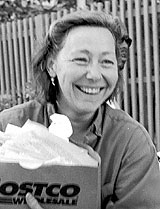Berkeleyan
Sustainability summit shines light on campus environmentalism
![]()
| 04 May 2005
At the second annual UC Berkeley Sustainability Summit, held last Thursday, the campus honored the green-minded among us and awarded grants to six campus units through the Chancellor's Green Campus Fund. It also unveiled hot-off-the-press copies of the "UC Berkeley Campus Sustainability Assessment," a 122-page environmental report card on diverse campus systems, ranging from water use in toilets to the fuel efficiency of campus vehicles.
At the well-attended and high-spirited summit, Chancellor Birgeneau presented five UC Berkeley Sustainability Awards to staff, students, and faculty for outstanding efforts to promote the campus's environmental sustainability. Those honored were:
 Lisa Bauer (Peg Skorpinski photo) |
. A Cal Dining staff team, for its work to gain Green Business certification at Crossroads and Clark Kerr dining facilities. The facilities compost food waste (60 tons a year), recycle food packaging (350 tons a year), offer discounts for use of reusable mugs, and use biodegradable containers and unbleached napkins.
. Bill Berry, professor of earth and planetary science, for "exploring environmental issues with generations of Berkeley students." Berry was honored for "giving students the tools and inspiration to think about problems from a sustainability standpoint and fostering a culture of sustainability and forward-thinking design."
. Mezies Chen, a December 2004 graduate of the College of Engineering, who worked with Parking and Transportation to implement a system to provide real-time information on the location of campus shuttle buses.
. The ASUC Sustainability Team, for its work to advance the student government's work on such issues as energy use and food and paper waste.
Also at the summit, the Chancellor's Commission on Sustainability (CACS) announced the first six projects to receive funding through the Chancellor's Green Campus Fund, which supports innovative efforts to create a greener, more environmentally sustainable campus. CACS selected proposals from students, faculty, and staff. This year's winners are:
. Biodiesel-fuel processing: $1,500 to the Berkeley Energy Alliance for Renewables to start a biodiesel-processing operation, which will convert used vegetable oil from campus dining halls into fuel for use in vehicles used by Physical Plant-Campus Services.
. Grinnell Natural Area native-plant restoration: $1,500 to purchase native plants for habitat restoration along Strawberry Creek.
. Bicycle transportation: $1,480 to purchase bicycles for staff at Environment, Health, and Safety, for use on and around campus to help reduce use of low fuel-efficiency trucks.
. Energy-efficiency reminders: $595 for an undergraduate project to distribute stickers reminding users to turn lights and computer monitors off when not in use.
. Student-group networking: $310 for office supplies for the student-run Environmental Coalition (a.k.a. ECo), which works to coordinate the work of student environmental groups on campus through recruitment and educational campaigns, improved communication, and record-keeping.
. Albany Village green space: $148 for supplies to build raised beds and benches for residents as part of their green space for gardening.
The Berkeleyan will report more fully in a future issue on the findings of the "UC Berkeley Campus Sustainability Assessment." In the meantime, it can be found online at sustainability.berkeley.edu.

